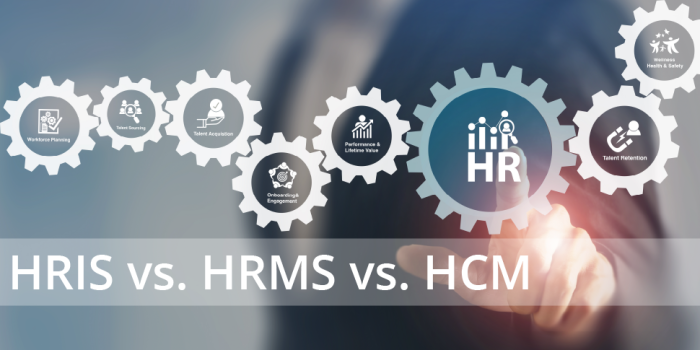As businesses grow and expand their workforce, the need for effective human resource management becomes critical. Terms like HRMS (Human Resource Management System), HRIS (Human Resource Information System), and HCM (Human Capital Management) often arise in conversations, but what do they truly mean, and how do they differ?
At PeopleWorX, we aim to simplify payroll and HR solutions for small businesses. This guide, aimed at small business owners and HR leaders, breaks down these concepts to provide clarity and help you determine which system is best suited for your business needs. While these terms have distinct features, they also share overlapping capabilities and functionalities.
What Is HRIS?
A Human Resource Information System (HRIS) is a digital tool designed to streamline HR operations by managing employee data efficiently. Think of HRIS as the foundational technology that automates administrative HR tasks, ensuring accurate record-keeping and compliance.
Core Features of HRIS:
- Employee Records Management: Centralized database storing comprehensive employee details, including personal information, employment history, and performance reviews.
- Payroll and Compensation Management: Automates payroll processing, tax calculations, and salary disbursement to ensure accuracy and compliance.
- Time and Attendance Tracking: Monitors employee attendance, work hours, leave requests, and overtime to optimize workforce productivity.
- Benefits Administration: Manages benefits programs, including health insurance, retirement plans, and other employee perks.
Who Should Use HRIS?
HRIS solutions are ideal for small to medium-sized businesses (SMBs) that need a structured system for storing employee data, ensuring payroll accuracy, and automating basic HR processes. If your primary goal is to maintain organized employee records and reduce manual administrative tasks, an HRIS is a great starting point.
What Is HRMS?
Human Resource Management System (HRMS) expands upon HRIS functionalities by incorporating more comprehensive workforce management tools. While HRIS focuses primarily on data and process automation, HRMS integrates additional elements such as talent acquisition, performance tracking, and compliance management.
Core Features of HRMS:
- Recruitment and Onboarding: Streamlines the hiring process with applicant tracking, job posting, and automated onboarding workflows.
- Performance Management: Enables organizations to set goals, conduct performance evaluations, and track employee progress over time.
- Training and Development: Provides learning management systems (LMS) to facilitate employee growth, skills development, and compliance training.
- Compliance and Regulatory Management: Helps businesses adhere to labor laws, workplace safety regulations, and reporting requirements.
Who Should Use HRMS?
HRMS solutions are best suited for organizations that require a more dynamic approach to workforce management. Companies looking to go beyond basic HR data storage and actively engage in performance tracking, talent acquisition, and employee development will benefit from an HRMS.
What Is HCM?
Human Capital Management (HCM) takes HR technology a step further by integrating strategic HR initiatives with workforce planning and development. HCM systems encompass all HRMS functionalities while focusing on optimizing human capital through talent management, succession planning, and advanced analytics.
Core Features of HCM:
- Talent Acquisition and Retention: Provides advanced tools for identifying, attracting, and retaining top talent through workforce planning and employer branding.
- Employee Engagement and Experience: Includes tools to boost employee satisfaction, collaboration, and workplace culture through surveys and feedback mechanisms.
- Succession Planning: Identifies high-potential employees and prepares them for leadership roles through training and mentorship programs.
- Advanced Analytics and Workforce Planning: Uses data-driven insights to optimize hiring decisions, track workforce trends, and align HR strategies with business objectives.
Who Should Use HCM?
HCM solutions are designed for businesses focused on long-term workforce planning and strategic HR initiatives. Growing enterprises and organizations looking to align their HR strategy with broader business goals will find HCM an invaluable tool.
How Are They Similar?
While HRIS, HRMS, and HCM serve different purposes, they all share fundamental HR functionalities, including payroll processing, benefits administration, time tracking, and employee self-service portals. Most modern HR software solutions are cloud-based, offering scalability, security, and integration with other business applications. The primary goal across all these systems is to enhance efficiency, improve data accuracy, and reduce the burden of manual HR processes.
What Is the Difference?

In summary:
- HRIS focuses on operational HR functions and basic information management.
- HRMS expands into talent acquisition, performance tracking, and training.
- HCM incorporates strategic workforce planning, leadership development, and advanced analytics.
Which Solution Is Right for Your Business?
The best choice depends on your business size, goals, and HR challenges:
- Choose HRIS if your priority is data management, payroll automation, and compliance for a small or medium-sized business.
- Choose HRMS if you want a broader HR platform that includes recruitment, performance management, and employee engagement tools.
- Choose HCM if you’re focused on long-term workforce planning, talent retention, and aligning HR strategies with business growth.
Why Choose PeopleWorX?
At PeopleWorX, we specialize in providing tailored HR and payroll solutions for small businesses. Whether you need a simple HRIS to manage employee records or a full-scale HCM solution to drive business growth, our cloud-based technology adapts as your business evolves.
Our services include:
- Scalable HR Solutions: From entry-level HR automation to advanced workforce management.
- Compliance and Risk Management: Helping you navigate labor laws and industry regulations effortlessly.
- Expert Support: Dedicated HR professionals are available to guide your business at every stage.
We empower businesses to focus on what truly matters, growing their teams and achieving long-term success.
Making the Right Decision for Your Business
Understanding the differences between HRIS, HRMS, and HCM enables you to make informed decisions about managing your workforce effectively. Selecting the right system can enhance productivity, improve compliance, and optimize employee engagement.
At PeopleWorX, we are committed to helping small businesses navigate the complexities of HR technology. Whether you need basic HR support or a robust system to drive strategic growth, we’ve got you covered.
Ready to simplify your HR and payroll processes? Contact us today to learn more!
If you need help with workforce management, please contact PeopleWorX at 240-699-0060 | 1-888-929-2729 or email us at HR@peopleworx.io






